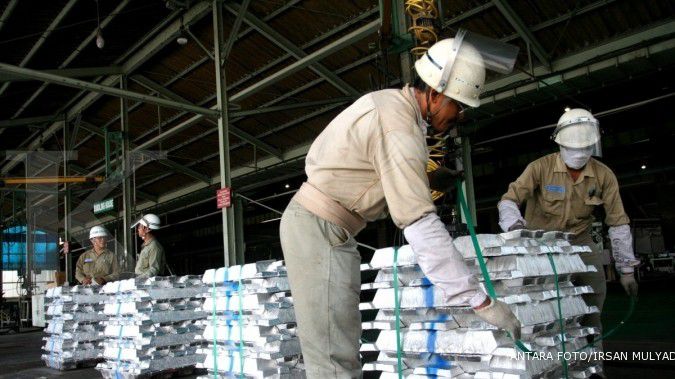JAKARTA. State-owned diversified miner PT Aneka Tambang (Antam) and state aluminum producer PT Indonesia Asahan Aluminium (Inalum) are set to establish a joint venture to commence the construction of a smelter-grade alumina refinery, in which the former will hold a minority stake in the plant. While details on the joint venture are not available yet, Inalum president director Sahala Sijabat said that his firm would own a minority stake in the venture. “We hope that we can reach a non-disclosure agreement with Antam shortly, before finally establishing a joint venture for the project,” he told The Jakarta Post, referring to the smelter-grade alumina (SGA) refinery in Mempawah, West Kalimantan. Antam corporate secretary Tri Hartono confirmed the partnership plan, but refused to elaborate further, saying that the company was still waiting for a final decision on its proposed stimulus proposal. Antam previously proposed a Rp 7 trillion (US$546.9 million) capital injection to finance three mega projects — Mempawah’s SGA refinery, a ferronickel smelter in Halmahera, North Maluku, and an anode slime project — but House of Representatives Commission VI had agreed to only Rp 3.5 trillion at the time of writing. The figure is, however, still subject to change as it will still need approval from the House’s budget committee. State-Owned Enterprises (SOEs) Minister Rini Soemarno said on Wednesday that Commission VI had decided to approve only half of the proposed stimulus for Antam as it assumed that Antam could collaborate with Inalum for the Mempawah project. “Inalum could participate on the Mempawah project by holding a stake in the project. The ownership composition is still being calculated,” she said. According to Antam’s internal data, the company has planned to hold a 32 percent stake in the Mempawah SGA refinery in the scenario that it would get Rp 7 trillion in stimulus funding. The $1.7 billion refinery is expected to begin operating in 2017 with an annual capacity of 1.6 million metric tons. The firm previously stated that it was seeking a partner to hold between 30 percent and 35 percent ownership in the plant. The smelter-grade alumina plant will convert bauxite into alumina,―an intermediate aluminum product. Sahala said that once the refinery was in operation, his firm could stop importing alumina from Australia as well as slash freight costs. Inalum currently imports around 500,000 tons of alumina from Australia and would need around 1 million tons in the next five years to meet ballooning domestic demand for aluminum, he went on. Domestic demand for aluminum currently stands between 600,000 and 800,000 tons per year and is forecast to keep growing. Sahala went on to say that the refinery would also cut Inalum’s alumina freight cost as it would just need to transport the alumina from Mempawah to Kuala Tanjung port in Sumatra instead of from Australia. “We estimate that it will cut our freight costs to around $20 to $25 per tons from the current $35 tons per ton,” he explained. (Khoirul Amin)
Antam, Inalum team up on Mempawah refinery project
JAKARTA. State-owned diversified miner PT Aneka Tambang (Antam) and state aluminum producer PT Indonesia Asahan Aluminium (Inalum) are set to establish a joint venture to commence the construction of a smelter-grade alumina refinery, in which the former will hold a minority stake in the plant. While details on the joint venture are not available yet, Inalum president director Sahala Sijabat said that his firm would own a minority stake in the venture. “We hope that we can reach a non-disclosure agreement with Antam shortly, before finally establishing a joint venture for the project,” he told The Jakarta Post, referring to the smelter-grade alumina (SGA) refinery in Mempawah, West Kalimantan. Antam corporate secretary Tri Hartono confirmed the partnership plan, but refused to elaborate further, saying that the company was still waiting for a final decision on its proposed stimulus proposal. Antam previously proposed a Rp 7 trillion (US$546.9 million) capital injection to finance three mega projects — Mempawah’s SGA refinery, a ferronickel smelter in Halmahera, North Maluku, and an anode slime project — but House of Representatives Commission VI had agreed to only Rp 3.5 trillion at the time of writing. The figure is, however, still subject to change as it will still need approval from the House’s budget committee. State-Owned Enterprises (SOEs) Minister Rini Soemarno said on Wednesday that Commission VI had decided to approve only half of the proposed stimulus for Antam as it assumed that Antam could collaborate with Inalum for the Mempawah project. “Inalum could participate on the Mempawah project by holding a stake in the project. The ownership composition is still being calculated,” she said. According to Antam’s internal data, the company has planned to hold a 32 percent stake in the Mempawah SGA refinery in the scenario that it would get Rp 7 trillion in stimulus funding. The $1.7 billion refinery is expected to begin operating in 2017 with an annual capacity of 1.6 million metric tons. The firm previously stated that it was seeking a partner to hold between 30 percent and 35 percent ownership in the plant. The smelter-grade alumina plant will convert bauxite into alumina,―an intermediate aluminum product. Sahala said that once the refinery was in operation, his firm could stop importing alumina from Australia as well as slash freight costs. Inalum currently imports around 500,000 tons of alumina from Australia and would need around 1 million tons in the next five years to meet ballooning domestic demand for aluminum, he went on. Domestic demand for aluminum currently stands between 600,000 and 800,000 tons per year and is forecast to keep growing. Sahala went on to say that the refinery would also cut Inalum’s alumina freight cost as it would just need to transport the alumina from Mempawah to Kuala Tanjung port in Sumatra instead of from Australia. “We estimate that it will cut our freight costs to around $20 to $25 per tons from the current $35 tons per ton,” he explained. (Khoirul Amin)



